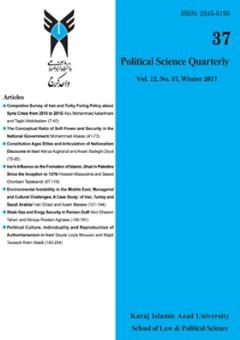Iran's nuclear crisis with Western countries, its impact on the development process in Iran
Subject Areas :
samad ghaempanah
1
![]() ,
Siamak Bahrami
2
,
Monir dashtivarmazani
3
,
Siamak Bahrami
2
,
Monir dashtivarmazani
3
1 - Assistant Professor of International Relations, Political Science Department, Takestan Branch, Islamic Azad University, Takestan, Iran.
2 - Assistant Professor, Department of Political Science, Kermanshah Branch, Islamic Azad University, Kermanshah, Iran.
3 - PhD student of Iranian issues, Department of Political Science, Kermanshah Branch, Islamic Azad University, Kermanshah, Iran.
Keywords: Development, sanctions, foreign policy, Iran,
Abstract :
Iran's nuclear crisis with Western countries has been one of the most important political and economic challenges in recent years, which has had a wide impact on the country's development process. This research examines the different dimensions of this crisis and its impact on Iran's development processes. In this regard, international pressures, economic sanctions and restrictions caused by the nuclear crisis have been analyzed. Also, the research examines the impact of this crisis on key sectors such as economy, energy, industry and technology, environment and diplomatic relations of Iran and shows how these factors have hindered the achievement of sustainable development goals. The findings of this study show that despite Iran's efforts for independent development, international sanctions and pressures caused by the nuclear crisis have created major challenges in the country's economic and political development. In the end, possible solutions to reduce tensions and facilitate the path of development are also discussed.
Development, sanctions, foreign policy, Iran
اعتماد، علی. (1390). «روابط هستهای ایران و روسیه». ماهنامه سیاسی ایران.
آل یاسین، س. (1393). «بررسی برنامههای توسعه اقتصادی ایران».
بانک مرکزی جهوری اسلامی ایران، نرخ نامه ارزی، سالهای مختلف، /exrates/ir.cbi://https.
ترابی، سید علی. (1399). «سیاست خارجی جمهوری اسلامی ایران». تهران: نشر مطالعات بینالمللی.
تقی زاده، ر (1395). *تأثیر تحریم ها بر صنعت نفت ایران*. مجله نفت و گاز.
جعفری ولدانی، ع. (1382). «تحولات سیاست خارجی ایران در دوره اصلاحات».
خدایی، اسفندیار. (1398)؛ تحریمهای اقتصادی و مسائل زیستمحیطی در ایران، فصلنامه علمی روابط خارجی. دوره 8، شماره 1، فروردین
دادگر، حسن. (1386). «تحلیل اقتصادی پس از انقلاب»، تهران: نشر دانشگاهی.
دژپسند، فرهاد و رئوفی، محمدرضا. (1387). «بررسی تحولات اقتصادی ایران». مجله بررسیهای اقتصادی.
دهقانی فیروزآبادی، س. (1387). «نقش شورای عالی امنیت ملی در سیاستگذاری هستهای».
رنجبر، مقصود (1394)، تهدیدات هستهای و امنیت ملی ایران، تهران: پژوهشکده مطالعات راهبردی.
سازمان مدیریت و برنامه ریزی (۱۳۸۸). گزارش اقتصادی سال ۱۳۸۶ و نظارت بر عملکرد سه سال اول برنامه چهارم توسعه. تهران معاونت نظارت راهبردی دفتر نظارت برنامه
سلطانی، فخرالدین (1395)، تحلیل سیاست خارجی ایران در دوره نهم و دهم ، تهران: نشرنو
سلطانی، م. (1395). «تحلیل سیاست خارجی ایران در دوره نهم و دهم».
شورچی، م. (1395). «عدالت اجتماعی و سیاست خارجی در دولت احمدینژاد».
صادقی، ح. (1398). *تحریم های اقتصادی ایران *. مجله سیاست خاورمیانه.
صالحی اصفهانی، ح. (1400). بررسی تأثیر تحریمها بر رشد اقتصادی ایران.
صدری، رضا. (1396). «بازتاب سیاست هستهای ایران». مجله سیاست جهانی.
طاهری، شهنام، (1397). تفاوت میان رشد اقتصادی و توسعه اقتصادی، توسعه اقتصادی وبرنامه ریزی،تهران،5/3/1397.
ظریف، م. (2019). *معامله ایران: یک دستاورد بزرگ*. امور خارجه
عربی مهدی، تقوی مهدی، رویایی رمضانعلی، بنی مهد بهمن. (1398)، محتوای اطلاعاتی صورت های مالی در فرایند تشدید تحریمهای اقتصادی بر ایران، نشریه: بررسیهای حسابداری و حسابرسی، دوره: 25 ، شماره:1، 91-112.
قوام، عبدالعلی (1400)، روابط بین¬الملل نظریه¬ها و رویکردها، تهران: سمت
متقی، ابراهیم (1394)، تحلیل بحران هستهای ایران ، تهران: مفید
متقی، م. (1394). «تحلیل بحران هستهای ایران».
وفایی، ع. (1396). نقش دولت در توسعه اقتصادی ایران.
Borowie, Andrew. (2006). "Dissident Offers Partisan Look at Iranian Threat to West," Guardian, 30 August.
Frank, A.G. (1967). *Capitalism and Underdevelopment in Latin America*. Monthly Review Press.
Giddens, A. (1990). *The Consequences of Modernity*. Stanford University Press.
Huntington, S.P. (1968). *Political Order in Changing Societies*. Yale University Press.
IAEA (2020). *Nuclear Technology Review*. International Atomic Energy Agency.
Katzman, K. (2015). *Iran’s Nuclear Program: Status*. Congressional Research Service.
Kausch, HansG (1982), Boyccot; Encyclopedia of Public nternational. World Politics; Vol. 57
Lerner, D. (1958). *The Passing of Traditional Society: Modernizing the Middle East*. Free Press.
Lucas, R. (1988). “On the Mechanics of Economic Development”. Journal of Monetary Economics, 22
Malloy, P (1995), Economic Sanctions and Human Rights: A Delicate Balance; www.wcl.american: edu/hrbrief/
Mousavian, Seyed Hossein (2012). The Iranian Nuclear Crisis: A Memoir. Washington, DC: Carnegie Endowment for International Peace, 2012 on May 3, 2012
Nakanishi. Hisae (2015). The Construction of the Sanctions Regime Against Iran: Political Dimensions of Unilateralism. Economic Sanctions under International Law. First Online 01 January.
Romer, D. (2012). “Advanced Macroeconomics”. 4th ed. New York: McGraw-Hill/Irwin.
Rostow, W. (1990). “The Stages of Economic Growth. A Non-Communist Manifesto”. 3rd ed., New York: Cambridge University Press.
Rostow, W.W. (1960). *The Stages of Economic Growth: A Non-Communist Manifesto*. Cambridge University Press.
Salehzadeh, M. (2016). *Democracy and Economic Development*. Tehran University Press.
Sanders, Philippe (2001), Bowt''s Law of International Institutions, Fifth Ed: London, Sweet & Maxwell
Tabatabai, Ariane (2020). "NUCLEAR DECISION-MAKING IN IRAN: IMPLICATIONS FOR US NONPROLIFERATION EFFORTS". The National Interest. Retrieved 2023-12-06.
Todaro, M. & Smith, S. (2012). “Economic Development”. 11th ed. Boston, Mass: Addison-Wesley.
William Alberque, Hasan Alhasan, Emile Hokayem and Amnah Ibraheem. (2023). Mitigating the risks of an unconstrained Iranian nuclear programme. The International Institute for Strategic Studies
Yueh, L., & Sander, D. (2021). *Globalization and International Trade*. Cambridge University Press.


